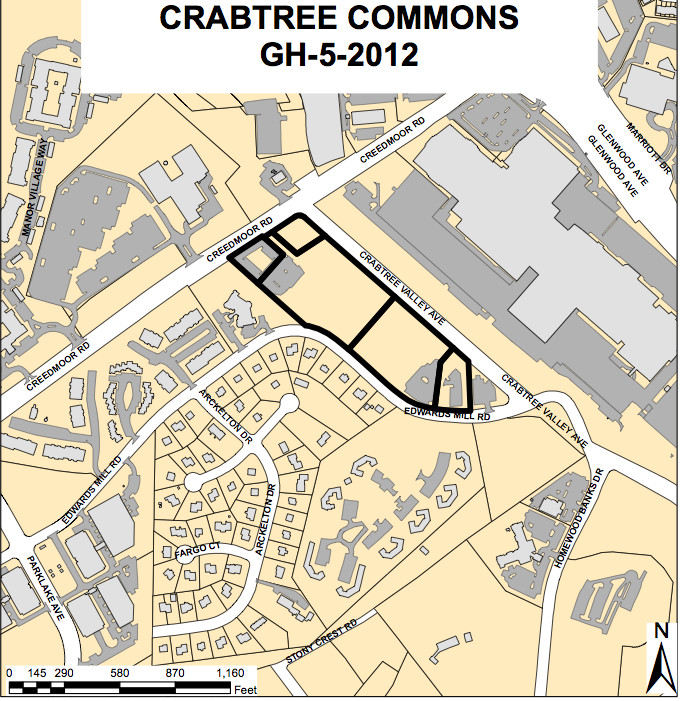The ongoing saga continues between developers of two neighboring pieces of land.
Weingarten Investments recently filed a citizen-initiated comprehensive plan amendment that would change the land use designation for its neighbor, Pinnacle Properties.
The proposed change would remove the potential for office and retail development on the Pinnacle property, only permitting residential development. The undeveloped property is located south of Edwards Mill Road, between its intersections with Arckelton Drive and Crabtree Valley Avenue.

The request is part of an ongoing dispute between the two property owners that has resulted in a lawsuit and court battle.
Robin Currin, an attorney representing Pinnacle Properties, said her client opposes the request.
“This is not our request. This is the request by a neighboring property owner,” Currin said. “Obviously we oppose this request. We do not believe that it has any legitimate basis whatsoever.”
Currin said that Weingarten Investments representatives said they would drop the application if Pinnacle Properties dropped its lawsuit.
The Planning Commission studied future land use designations in this area of Raleigh several months ago and made no changes. Currin said that there is no reason to make changes now.
“We do think this was vetted in great detail four months ago and there’s no reason to come back and change it now,” she said.
Commissioner John Buxton suggested sending the application to the Committee of the Whole, where Commissioners have the ability to discuss issues more deeply.
“I just want to make sure we have a chance to really go through this like we can in committee,” he said.
Both the property owner and the applicant agreed to further discuss the issue in committee.
Commissioners will also discuss an amendment for a piece of property on Leesville Road, south of Strickland Road, which would allow retail use on the property.
Currently, only office and residential uses are allowed in the area.
Both cases will be discussed at Committee of the Whole meeting at 9 a.m. Tuesday.
More Retail for North Boylan Residential Building
If approved, public retail space will be included in a North Boylan Avenue apartment building currently under construction.
Planning Commissioners voted to send a request to rezone a 1.7-acre property to City Council for a public hearing with a recommendation for approval. The property is located on North Boylan Avenue across from the 712 Tucker building.
The residential building associated with the rezoning is already under construction. The rezoning will allow for more retail use on the first floor of the building than under the current zoning.
As it stands now, the building is only allowed to have ancillary retail, which is meant to only serve the occupants of the building, such as a coffee shop located in an office building.
The new rezoning would open that space up to public use.
Shane White, of Southern Land Company, said the purpose of the request is to increase the potential uses in the first floor of the building.
“We wanted to guarantee yourselves [Planning Commission] and the public that we’re not asking to do anything different than we already were as related to density,” White said. “As much as anything else, just trying to offer our leasing agent a little more flexibility in the types of uses that we can put in the ground floor.”
City Councilors will approve or deny the recommendation for a public hearing at its meeting next week.
Progress Report on 2030 Comprehensive Plan
Planning Department staff presented its annual progress report on the 2030 Comprehensive Plan. The annual review is designed to analyze recent trends, and compare past decisions with policy within the Plan.
Several rezoning cases from 2013 were inconsistent with the comp plan. Of the 24 approved rezoning requests, 10 were inconsistent. Four of the inconsistent cases allowed an increase in residential density beyond the recommendation for future land use. The remaining six introduced retail or office development in areas designated for residential use.
City staff reviewed current trends that might impact the plan, with four emerging issues identified and discussed: resilient communities, innovation districts, sharing economy, and autonomous vehicles:
- Resilient communities means the city’s ability to respond to natural disasters and other unforeseen threats and sustain impacts without impacting the overall community health.
- Innovation districts were discussed as a way to help Raleigh achieve meaningful local economic change. They cluster both established and new companies into districts that include office, residential and retail uses as well as public spaces and transit access. Citrix’s relocation of its headquarters to the old Dillon Supply steel warehouse just west of downtown was cited as an example of a growing innovation district in Raleigh.
- Sharing economy is a range of services, activities, spaces and goods that can be shared. They include: car sharing, bike sharing, cooperatives, community farms, shared housing and shared workspaces. Several policies and actions in the comp plan, for example, encourage shared transportation as a way to decrease pollution, congestion, car ownership and the space needed for parking in the city.
- Autonomous Vehicles are another emerging trend. They are a technology of the future that has the potential to reshape transportation patterns, travel habits and urban design.